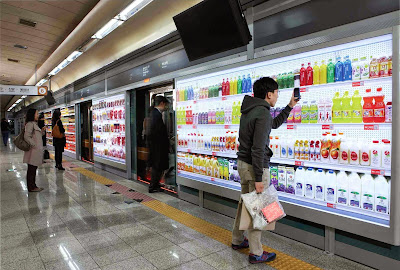Tesco's Virtual Store
During my undergraduate study at University of Southampton the lecturer in a module showed us a video of how Tesco operates and market themselves in Korea. On Friday my lecturer in Customer Insight also showed that very same video. After watching the movie for the second time, I really started to ponder exactly why Tesco does not adopt the same marketing practices in UK.
In South Korea, Tesco has re-named themselves to Tesco Homeplus. However, it was not merely the name that they changed. They also completely transformed the ways in which they reach out to the consumers. Tesco created a virtual subway store to adjust to the Korean market. The cultural notions of Korea is completely unique and allows this innovation to work. Koreans are very busy people and have very long working hours. For them grocery shopping is rather a bother than an enjoyable experience. Owing to this, Tesco made the decision of letting the store come to the people. While Koreans are travelling back home from work they can shop in the subway while waiting for the train. The reason why this type of shopping experience is successful is because the virtual shop really creates the feeling of being inside a shop. There are pictures on the walls made to look like the shelves with groceries inside a real supermarket. Hence, the shopping experience is maintained. Travellers can place the order with their smartphone, which is very convenient and effortlessly. When the shoppers arrive home their groceries is on the way to be delivered at their home.

One might think that such an incredible innovative idea would work wonders in busy areas in UK as for example London. Then why does not Tesco create virtual shop in the London Underground? Londoners might be busy people as well, they work less working hours than Koreans. Arguably, the cultural elements of Korea are huge determinators of the decision to implement the virtual store. I would say that Londoners still enjoy the experience of going shopping in store compared to doing it virtually. Of course with the advent of such a shopping option, the virtual shop would probably receive a lot of popularity. However, in the long term they would miss walking around in the traditional stores and enjoying the experience. Some of my friends living in London has frequently told me that they like shopping in stores. They do not see it as a stressful part of the day, but rather enjoy the moment. Perhaps its due to their shorter working hours, but could also be because of some more underlying cultural notions.
Tesco made a clever move by approaching the Korean market in this way. They recognised the consumers needs and adapted an approach that suited the lifestyle. However, I doubt the virtual store could be as successful in UK. If it was a high probability that it would be profitable Tesco probably would have implemented already.


I think it's really smart that Tesco takes Korean culture and lifestyle into consideration when expanding their business to that country.
ReplyDeleteNever heard about this virtual store. I would really like to try it, but think if they have it in europe people would only be fascinated for a while before we starts to miss actually going around in the store as in normal shopping.
ReplyDelete